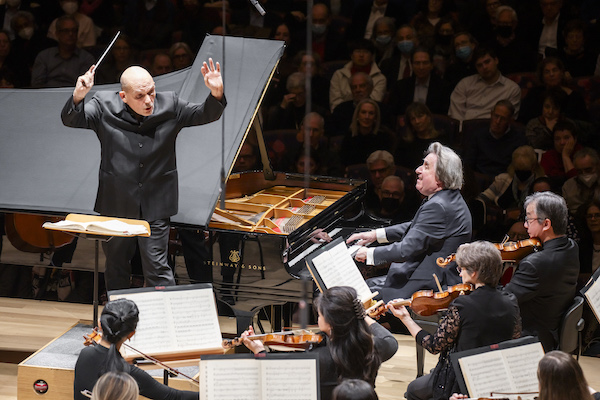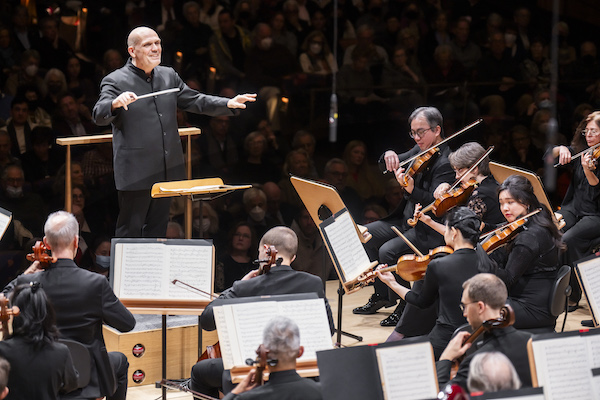Philharmonic opens new year with hearty German comfort food for a winter night

Just in time for the first real snowfall in New York City in almost two years, the New York Philharmonic returned for their first subscription concert of the new year with the kind of hearty, meat-and-potatoes musical fare that can fortify mind and soul on cold winter nights. The program was all 19th-century music from the greatest composers of German romanticism: Beethoven, Brahms, and Wagner.
Famous names, famous works. With Jaap van Zweden conducting, the Philharmonic played the Prelude to Act I of Die Meistersinger von Nürnberg, Beethoven’s Piano Concerto No. 4—with soloist Rudolf Buchbinder—and finished with Brahms’ Symphony No. 4. All received robust performances equal to the heartiness of the music, even if not everything was as refined as the recipes indicated.
Van Zweden kicked the Wagner Prelude immediately into gear with high energy, perhaps slightly too much. From the first moments, the orchestra had the warmest sound one has heard from them yet in the revamped David Geffen Hall. But the performance also had an edge that often felt too aggressive, as if forcing grandeur rather than discovering it or letting it grow. Gradually, as the playing went along, a sense of relaxation arose and the music-making took on a pleasing inner glow.
Buchbinder was an excellent complement for the mood of this program. The Austrian pianist is one of those artists who always sounds just right, and he displayed impeccable judgement again in this performance.
There was great balance in his playing, the feeling that phrases began and ended exactly where and how they should. That created space and transparency and the illusion that he had all the time in the world to work with, even as Allegro and Vivace tempos ticked by. His musicality was manifest especially as he played through the turmoil of Beethoven’s cadenzas. The soloist was at his finest in a gorgeous, time-stopping Andante.
The pairing with the Philharmonic was not as fine. The orchestra maintained a good level of energy but coordination was not always there when it needed to be.

Jaap van Zweden conducted the New York Philharmonic in music of Wagner, Beethoven and Brahms Thursday night. Photo: Chris Lee
The Brahms symphony was the most focused, committed, and prepared performance of the night. If there had been nervous energy when the concert opened, now there was nothing but strength tempered by tenderness and expression. The opening movement was rich with feeling and van Zweden had an easy command of the large-scale form and direction, as well as the fleeting changes in tempo and dynamics from which the edifice is built.
In the Andante moderato, principal clarinetist Anthony McGill’s beautiful playing stood out, a wide openness of expression coming out of the simplest, most elegant phrasing. The Allegro giocoso was stirring and powerful while also light-footed, an impressive feat for a large orchestra.
Brahms’ passacaglia finale remains problematic with the variations sounding somewhat forced, packing in gestures and asserting expressive meaning without fully preparing or generating it. It wasn’t the orchestra’s fault but the issues weren’t entirely surmounted, even with playing as fine as this. The Philharmonic’s playing was as good as before, but they could not quite bring out the same ravishing level of feeling.
This program will be repeated 2 p.m. Friday, 8 p.m. Saturday and 2 p.m. Sunday. nyphil.org
Posted Jan 07, 2024 at 12:53 pm by John F Kelly
“But the performance also had an edge that often felt too aggressive,” Yes, that’s pretty much JVZ’s calling card…………